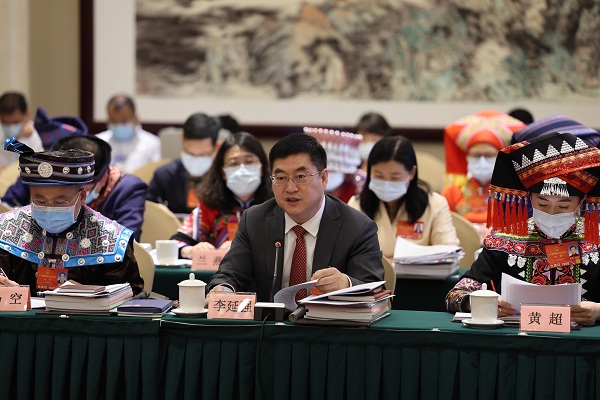Beibu Gulf to transform local economy

Li Yanqiang (C), the chairman of the Beibu Gulf Port Group, is also a deputy to the National People's Congress. [Photo provided to chinadaily.com.cn]
The chairman of the Beibu Gulf Port Group, Li Yanqiang, is also a deputy to the National People's Congress. He stated that his greatest aim for the New International Land-Sea Trade Corridor is to become an economic artery that delivers coordinated growth to the communities adjacent to it.
Li began working in the Beibu Gulf area in 1998 and stated that the gulf did not have enough cargo for transportation because of the gulf's lack of operational capacity, despite the fact that it was the nearest sea gate for cargo from southwest and mid-south China to reach ASEAN countries.
Chongqing, Guangxi, Guizhou and Gansu signed an agreement in 2017 to jointly build a corridor with Singapore and the corridor is now the current New International Land-Sea Trade Corridor.
On April 28, 2021, the number of sea-rail intermodal trains operating on the corridor surpassed 10,000, and the train can now reach 92 stations in 47 domestic cities spread throughout 13 provinces, municipalities, and autonomous regions. Along the route, 12 dry ports have been constructed.
The key routes between inland China and the Beibu Gulf will be cleared progressively, according to Li, and coastal ports' service capacity will be increased.
The Beibu Gulf will also engage in active matchmaking with the Yangtze River Economic Belt, the Sichuan-Chongqing area, and the Hainan Free Trade Port, as well as deepen cooperation with neighboring provinces such as Hunan, Yunnan, and Guizhou, to improve transportation, logistics, commerce, trade, and industry integration.
Li went on to say that the corridor's construction will take advantage of the Regional Comprehensive Economic Partnership while also encouraging China-ASEAN cooperation and opening-up.
